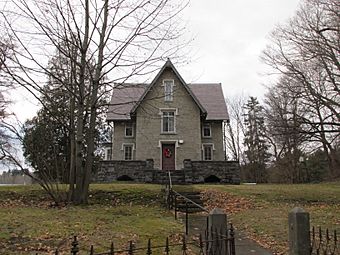Taconic and West Avenues Historic District facts for kids
Quick facts for kids |
|
|
Taconic and West Avenues Historic District
|
|

First Church of Christ Scientist
|
|
| Location | Great Barrington, Massachusetts |
|---|---|
| Area | 117 acres (47 ha) |
| Architect | Allen, Daniel; et al. |
| Architectural style | Georgian, Early Republic, Mid 19th Century Revival |
| NRHP reference No. | 98000680 |
| Added to NRHP | June 11, 1998 |
The Taconic and West Avenues Historic District is a special area in Great Barrington, Massachusetts. It is located just south of the town's main center. This district is mostly made up of homes and other buildings. It is known for its history and unique architecture.
This historic district covers about 117 acres. It includes 172 important buildings, most of which are houses. About two-thirds of these buildings were built between 1890 and 1910. The other buildings were designed to match the older styles.
Contents
What is a Historic District?
A historic district is a part of a town or city that has special meaning because of its history. These areas are protected to keep their old buildings and unique look. The Taconic and West Avenues Historic District was added to the National Register of Historic Places in 1998. This means it is officially recognized for its historical importance.
Exploring the District's Homes
The Taconic and West Avenues Historic District is a great place to see many different kinds of old houses. The district starts at the corner of Maple and West Avenues. It is bordered by a wooded ridge on the west. Main Street and Maple Avenue form its eastern and southern edges.
Architectural Styles
The houses here were built by some of Great Barrington's wealthier families. They are large and show off many popular building styles from their time. You can see homes built in the:
- Georgian style: A classic, balanced look.
- Early Republic style: From America's early years.
- Mid 19th-Century Revival style: Buildings that brought back older designs.
A Look Back in Time
Great Barrington was first settled a long time ago, in the 1700s. It was the first county seat for Berkshire County. The town grew around a major crossing point of the Housatonic River. The river also provided power for local businesses.
How the District Grew
At first, most of the development in this area happened along Main Street. Examples include houses like the Dwight–Henderson House. Taconic Street was also important, as it was a main road leading northwest. For much of the 1800s, the district grew slowly. But in the 1880s, new streets were planned. This led to more homes being built, creating the neighborhood we see today.
 | William Lucy |
 | Charles Hayes |
 | Cleveland Robinson |



